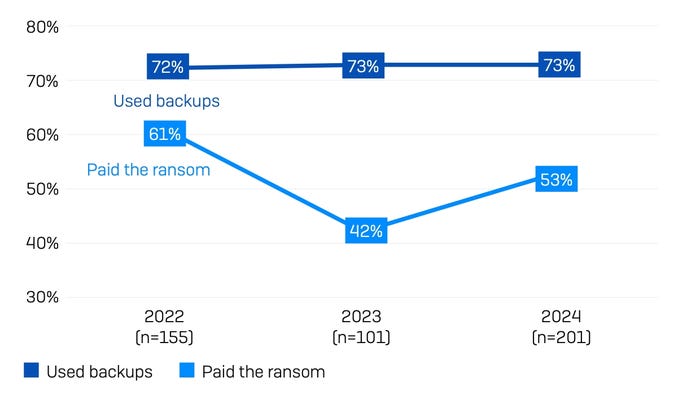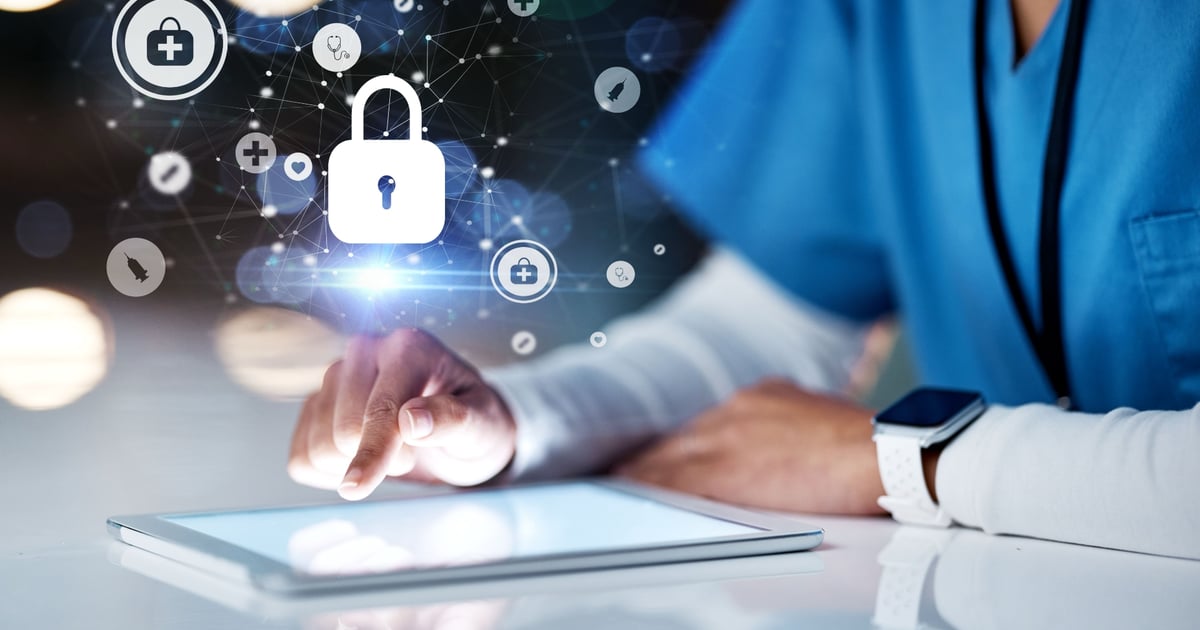The healthcare sector continues to develop, however with out the right concentrate on cybersecurity, the prognosis for the trade’s resilience towards ransomware and different assaults has solely worsened.
In opposition to a backdrop of non-IT disruptions — similar to personal fairness failures, shortages of medicines, and the slicing of companies — two-thirds (66%) of healthcare organizations additionally suffered ransomware assaults prior to now 12 months, up from 60% within the prior 12 months, in accordance with a report from cybersecurity agency Sophos. Main assaults on hospitals and medical-service suppliers have led to disruptions of companies, important monetary outlay, and the publicity of delicate affected person knowledge. In some instances, additionally they affected affected person outcomes.
There are additionally new threats rising on a regular basis. The Trinity ransomware, as an example, first seen final Might, poses a “important risk” to the healthcare and public well being sector, in accordance with an alert this week from the US Division of Well being and Human Companies.
General, greater than 14 million US residents — and an unknown quantity worldwide — have been affected by healthcare breaches in 2024, in accordance with one other knowledge set from safety agency SonicWall.
Healthcare suffers such a cyber malaise that Senate Finance Committee chair Ron Wyden (D-Ore.), and Sen. Mark Warner (D-Va.) final week introduced laws to try to patch up the system. The invoice would require jail time for healthcare CEOs that misinform the federal government about their cybersecurity postures, supply federal sources to rural and underserved hospitals for cyber enhancements, and introduce accountability measures and necessary cybersecurity necessities for all organizations that maintain delicate knowledge. The invoice would additionally take away the present cap on fines for knowledge mishandling underneath the Well being Insurance coverage Portability and Accountability Act (HIPAA).
“Mega-corporations like UnitedHealth are flunking Cybersecurity 101, and American households are struggling in consequence,” Wyden mentioned in a press release saying the invoice. “The healthcare trade has a number of the worst cybersecurity practices within the nation regardless of its important significance to Individuals ’ well-being and privateness.”
Healthcare Cyber-Profiles Are Ripe for An infection
Healthcare organizations have three attributes that guarantee ransomware gangs will proceed to concentrate on the trade: Their operations are important to society, their expertise is commonly outdated and rife with vulnerabilities, and particular person organizations are prepared to pay ransoms, says Doug McKee, govt director of risk analysis of SonicWall.
“There’s some huge cash in healthcare, [and] healthcare isn’t solely infamous for having some huge cash, however they have been painted as an trade that is prepared to pay the ransom,” he says. “If we will preserve paying the ransom, the attackers are going to maintain ramping up in that trade. The maths is that easy.”
The cybersecurity issues plaguing the trade usually are not simply affecting the enterprise of healthcare. They’re additionally having actual impacts on sufferers and nationwide well being efforts. Attackers used stolen credentials, for instance, to compromise UnitedHealth subsidiary Change Healthcare and infect its methods with ransomware in February, resulting in stalled funds for medical doctors, pharmacies, and hospitals — and ultimately a $22 million ransom paid to the criminals. In the UK, an assault on medical-services supplier Synnovis in June led to delays in matching affected person blood varieties and different pathology companies. The identical month, an assault on South Africa’s Nationwide Well being Laboratory Service (NHLS) disrupted the service supplied by the government-run testing laboratories, whereas the nation discovered itself within the midst of an mpox outbreak.
“I can both pay the ransom, get again up and working, or I can attempt to rebuild it myself and pray that we get the whole lot again arrange working in every week — not an possibility,” says Errol Weiss, chief info safety officer (CISO) of the Healthcare Data Sharing and Evaluation Middle (Well being-ISAC). “So now, we have a sector who’s extra prevalent to pay, and I believe the dangerous guys — cybercriminals, nation-states which can be doing this — figured that out fairly shortly. I believe it is getting worse, and I believe that they’ve additionally found out the weak spots within the sector.”
A Pound of Remedy Usually Fails
The weakest spot for healthcare entities is arguably the inter-reliance of hospitals and pharmacies on their third-party suppliers. When Change Healthcare suffered its weekslong outage, the incident demonstrated that efforts to shore up cyber resilience has to increase all the best way to any third-party suppliers on which healthcare suppliers rely.
“Change Healthcare undoubtedly rocked the sector and made us [realize] that it is a single level of failure for thus many companies,” Weiss says. “We had hundreds of sufferers throughout the US that could not get prescriptions stuffed due to that outage, after which … we had hospitals that could not file claims.”
Equally, the assaults on Synnovis and NHLS slowed diagnostic companies.
Whereas their operational necessities — prioritizing human life, which implies retaining open the entry to wanted knowledge — pose difficult points, healthcare organizations should acquire oversight over their (typically legacy) expertise and the massive number of medical units and tools, which could not be saved completely updated. Seven out of each eight breaches have been attributable to exploitable vulnerabilities, compromised credentials, and malicious emails — so specializing in these three areas might pay important dividends for cybercriminals, says Christopher Budd, director of risk analysis for Sophos X-Ops.
“Healthcare — together with power, oil/gasoline, and utilities — is challenged by greater ranges of legacy expertise, and infrastructure controls greater than most different sectors, which seemingly makes it more durable to safe units, restrict lateral motion, and forestall assaults from spreading,” he says.
Time for an Ounce of Prevention
But, maybe most telling is the trade’s issues with backups.
In 95% of assaults focusing on healthcare organizations, the attacker tried to compromise the backups. Sadly, they succeeded in 66%, placing healthcare organizations’ defensive shortcomings behind that of solely the power, oil/gasoline, and utilities sector (79%) and the schooling sector (71%), in accordance with Sophos’ report.

Whereas healthcare organizations proceed to make use of backups to get well, many additionally pay ransoms. Supply: Sophos
The lack of backups leads to a lot worse — and dearer — outcomes, the report acknowledged. The worth of the preliminary ransom demand greater than tripled, to $4.4 million, in contrast with $1.3 million for organizations with backups, and the organizations have been much more more likely to pay the ransom, with 63% of organizations with a failed backup paying the ransom, in contrast with 27% of organizations with full backups.
In its risk transient, SonicWall really helpful the everyday trio of cybersecurity greatest practices: patch administration, robust entry controls, and steady monitoring. Nevertheless, out of these three, monitoring is an important functionality for organizations to ascertain first, says SonicWall’s McKee. Firms with good visibility can detect cybersecurity points early and remediate them earlier than they’re attacked, he says.
Whereas the outlook is at present messy, progress is being made, he added.
“I believe that we have gotten higher,” McKee says. “Over the past 5 years, I’ve seen an enormous enchancment in healthcare, so far as with the ability to flip round cybersecurity greatest practices … however [technology] has to get by means of all of the regulatory necessities … and that is merely going to take time … in all probability years, for healthcare to get to a degree that we’re in a position to cut back a number of the effectiveness of those assaults.”


